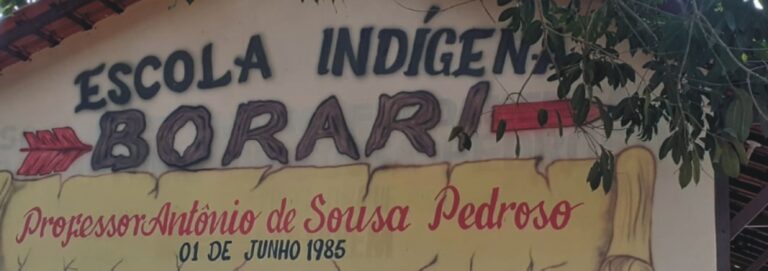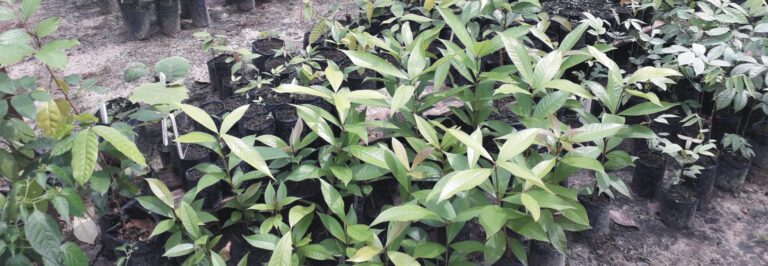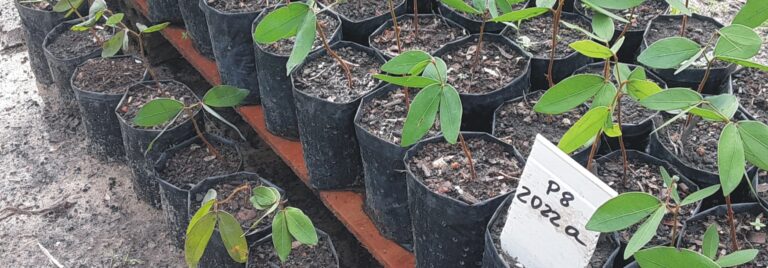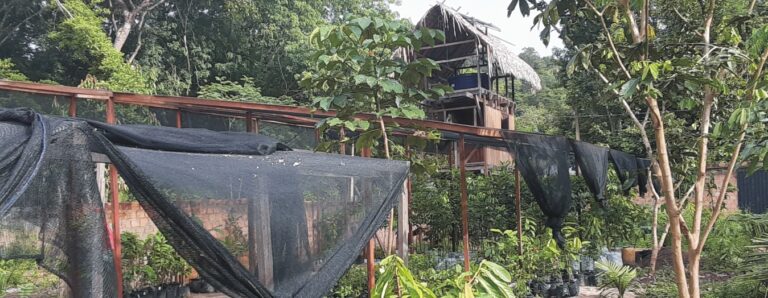Escola Professor Antônio de Sousa Pedroso
Escola Professor Antônio de Sousa Pedroso The Borari school Professor Antônio de Sousa Pedroso (Escola Professor Pedroso) was opened on May 30, 1985, by decree nº 772/85 – DAD. This school is centrally located in the village of Alter do Chão, on Rua Pedro Teixeira, s/n, Tapajós Region, Municipality of Santarém, State of Pará, Brazil. In June 2006, the SEMD coordination communicated to the management of this school that the school would function as indigenous education – as the community has always sought to preserve and maintain it’s Borari cultural identity. As of 2022 this school is under full Borari coordination. ACRAA Collaboration with this School After initial communications with the management of Escola Professor Pedroso in April 2022, ACRAA’s first collaboration with this school consisted of assiting with the preparations for, and then attending as honoured guests, celebrations at the school marking Indigenous Peoples Week. This event occured on…
Análise de Carbono
Carbon Footprint Analysis In this section we discuss the “carbon footprint” associated with travelling to the amazon to participate in our (near future) reforestation tourism program [1][2]. But at the outset here, to those that would immediatey scoff at such proposition simply because, yes, this does involve air travel, we respectfully argue — you do not undertsatnd the bigger picture here. Understand the amazon region is extremely economically depressed [3]. Even before the pandemic this was the case, but now it is much worse. As a consequence there are some here in Brazil calling for much higher levels of resource extraction (minerals, logging) and expansion of industrial agriculture (esp. soya). And this is occuring – with record rates of deforestation seen in 2022. See this recent article in Guardian. And this will continue to increase, unless we find alternate “green” forms of economic development. We see our reforestation tourism initiative…
School Ceremony April 18/22
Escola Professor Antônio de Sousa Pedroso – Indigenous Peoples Week Ceremony. April 18, 2022 On April 18, 2022 ACRAA was honoured with a role as part of the annual Indigenous Peoples Week ceremononies at the Escola Professor Antônio de Sousa Pedroso. This was an especially big honor as 2022 marks the first year that this school is under Borari coordination. This ceremony commenced just after mid-day with all students of this school attending. After an opening ritual in which we all joined hands and sang, the leaders of this school and community spoke. Thor was also given an opportunity to address the gathering and talk about ACRAA and our alliance with the Borari community, which was a great honor. A small tree planting ceremony then ensued for which ACRAA had made earlier preparations and also provided seedlings. The day also included all those present participating in the Ritual of Sairé.…
Máquina Land
Micro-Agroforestry System on Máquina’s Land Máquina (Cleidson da Conceição) was born in the Alter do Chão area, and has been instrumental in the construction of ACRAA’s water system and nursery (he is a very skilled construction worker). He owns a small partially treed property in a predominantly forested area outside of the village (here to be exact: -2.530419, -54.956013). He requested fruit bearing trees to establish a small agroforestry system on his property, which ACRAA donated to him in April of 2022. Several ACRAA associates (Diego, Daki, Mica, Thor, and along with Máquina) went to this property on April 12 to assist with planting. The photos below illustrate this day. Note the planting was not finished on April 12. Soon we will present photos of the completed work. Photo 1: The plants loaded ready to transport to Máquina’s property. Mica, an ACRAA associate and volunteer, is seen here. Apr.12/22. Photo…
First Planting Ilha do Amor
First Planting on the Ilha do Amor On February 4, 2022, we were honored to participate in a sacred tree planting ceremony on Ilha do Amor (Island of Love), marking our first restoration initiative at this ecologically significant site (Photos 1 to 8). This event represented more than just planting trees – it was a profound act of cultural and environmental healing for land that faces increasing pressure from tourism and climate change. The musical ceremony was beautifully led by Neca Borari, Chief of the local Borari Indigenous community, with drumming accompaniment by Juvenal Ferreira, also from the community. The rhythmic beats and traditional songs created a powerful connection between participants and the land, honoring ancestral traditions of environmental stewardship. ACRAA contributed five large Cumandá seedlings for this inaugural planting. These were particularly special as we planted them alongside their parent trees [1], ensuring genetic continuity and respecting the Borari…
Water Tower
ACRAA Water Tower / System When the ACRAA property was purchased, an artesian well was already in place. The first year of nursery operations was arduous, however, as all the water needed for our nursery had to be pumped manually. Therefore, in January of 2021 construction of a water system began in earnest. Photos 1 to 10 show the construction – the system is functioning wonderfully now. Photo 1: Raising the posts for our water tower. From front to back – Máquina, Jaci, Thor, Diêgo. Jan. 21, 2021. Photo 2: All four posts standing. Jan. 2021. Photo 3: Máquina and Diêgo starting the top platform. Jan. 26, 2021. Photo 4: Roof ready for the palm leaves. Mar. 10, 2021. Photo 5: Diêgo inspecting the trusses. Mar.11, 2021. Photo 6: Jaci, Daki and Diêgo preparing (opening) the palm leaves. Mar.12, 2021. Photo 7: Jaci securing the palm leaves. Mar.17, 2021. Photo…
Plantas Agroflorestais
Plants for Use in Agroforestry Systems and Urban Afforestation Agroforestry and Community Planting Initiative Located in the heart of the Amazon near Alter do Chão, Pará, the ACRAA nursery dedicates half of its production to supporting Indigenous agroforestry systems and urban greening projects. Unlike our ecological restoration work, these plants follow different guidelines—while we prioritize species naturalized to the Tapajós region, we include some non-native (but locally adapted) fruit and medicinal trees that benefit our Indigenous partners. Our Approach:• All seeds come from mature, fruit-bearing trees already thriving in our region• We prohibit non-local imports (no seeds from other biomes or countries)• Species are selected in dialogue with the Borari and Munduruku peoples, who receive most plants Current Agroforestry Collection (31 species):Fruit Trees: Pitanga; Pitomba; Graviola; Andiroba; Saputilha; Tamarindo; Ingá-cipó; Jambo; Rambutam; Cacau; Jambolão; Limão; Cupuaçu; Abiu; Cereja do Mato; Jaboticaba; Açaí; Graviola; Tangerina; Mari-mari; Jaca; Ingá-gordo; Castanha do Pará; Araticum;…
Plantas de Restauração
Plants for Use in Ecological Restoration / Reforestation The ACRAA nursery dedicates approximately half of its production to trees and plants for ecological restoration and reforestation efforts. We adhere to strict protocols, using exclusively native species that either naturally occur at or are ecologically suited to each planting site. To ensure traceability and quality control, we implemented a comprehensive seed-lot numbering and tracking system. Since March 2022, this system has been managed by our Brazilian Forest Engineer. Our classification system organizes trees and plants into three ecological categories, each marked by a distinct prefix: P – Árvores de Mata Ciliar (Riparian Forest Trees): Species native to the floodplain zones along the Tapajós River. F – Árvores da Floresta (Upland Forest Trees): Species adapted to the terra firme forests surrounding Alter do Chão. I – Árvores de Igarapés (Streamside Vegetation): Species thriving along the banks of small forest streams and natural springs. Each seedlot…
Agrofloresta
Agroforestry A basic definition of “agroforestry” is farming systems whereby trees and shrubs specifically selected for their ability to produce food, wood or other wanted products, are incorporated with agricultural crops and/or animals in a spatial and/or temporal manner (note that shade is also a valuable function of trees in agroforestry systems). The benefits of such systems over purely “un-treed” agricultural production are numerous, and include increased biological and economic resiliency, increased biodiversity, and carbon sequestration and storage. Incorporating trees into agricultural systems can also improve soil fertility and help heal degraded lands. See how here. We feel this science must be part of forest restoration efforts in the amazon, as forests that can sustain families and communities are needed to address food and economic security locally and regionally. Some, as in a recent article in the Guardian, have gone as far as to say that larger-scale reforestation (such as,…
Viveiro e Centro
Nursery & Center The ACRAA nursery is located on a wonderful property located right in the village of Alter do Chão [1], this only a short walk (15 min.) from the main village square or Praça, and only two blocks from the edge of a forest reserve that surrounds the village (Figure 1). This property will also be the home of our future “Center,” a place that we hope will become well known in the region and beyond as a meeting and educational center for people interested in reforestation and agroforestry in the Amazon. The nursery had its beginning in early 2020 with just a few seedlings, but now covers an area of about 250 square meters and with an ever-growing number and varierty of plants. Below is a selection of photos and videos that show this nursery on May 21, 2022. For a history of the nursery’s development. Click…









